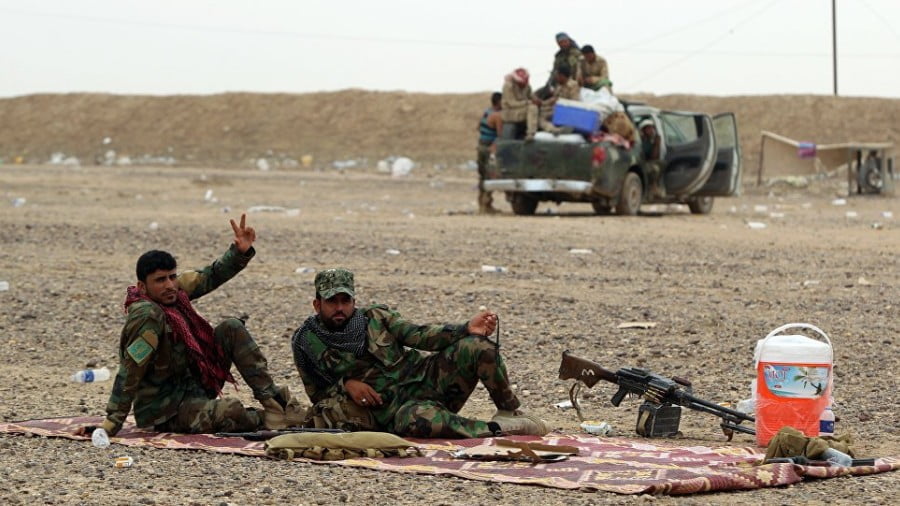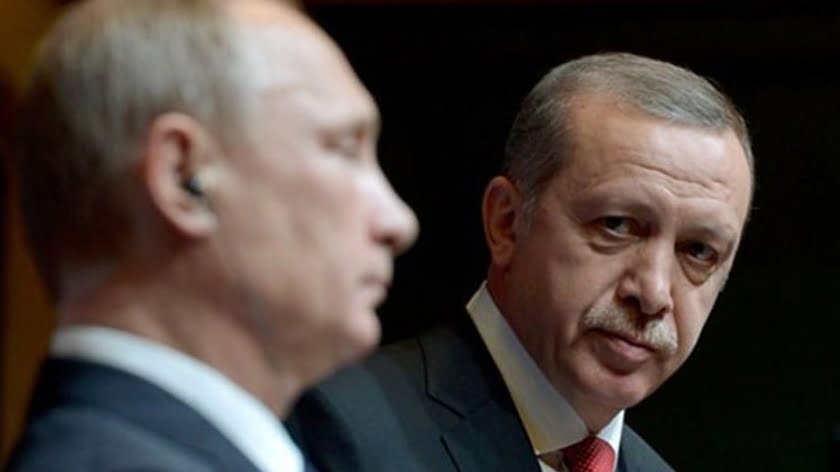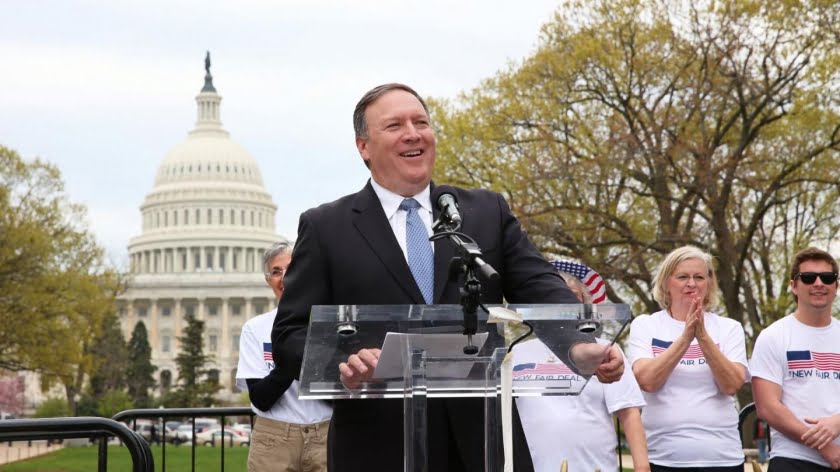Popular Mobilisation Units of the Islamic Resistance Could Bring about the Downfall of the Syrian Arab Republic
With the exception of the United States which has mastered the art of becoming the airforce and strategic leader of non-state guerrilla/terrorist groups in Syria, the remaining parties to the conflict all stand united against non-state entities.
Groups like Daesh, FSA and al-Qaeda are uniformly opposed by the states of Syria, Russia and Iran, while Turkey is currently engaged in action against the YPG/PKK terror group, in spite of the YPG’s proxy style relationship to the United States. In a broad sense, all of the major state players involved in the Astana process have a uniform goal of ridding Syria of terrorist groups, while pushing for a political settlement which preserves Syria’s territorial unity and sovereign political systems.
In spite of this each country has its own goals within this framework:
Syria
Syria seeks a political settlement that either compliments its military goal to liberate the entirety of its territory or is instigated after “every inch”of its legal territory is liberated from terrorist occupation.
Russia
Russia wants to wind down the military phase of the conflict as soon as possible so as to begin a political settlement that can preserve the Astana format as well as preserve the Syrian dignity, before the diplomatic disputes between state actors that are theoretically on the same side become wider, let alone before they reach a point of irreconcilable differences.
Iran
Iran’s view is identical to that of Damascus with the added component of using the Syrian conflict as a spring board to test the resilience of the Russo-Turkish partnership, as well as to test the overall strength of the Islamic Resistance against “Israeli” aggression. Russia clearly does not favour using the Syrian conflict as a means to end any other conflict that is unrelated to the establishment of political stability in the Syrian Arab Republic.
Turkey
While Turkey remains isolated from any formal political relations with Damascus, Turkey has accepted Syria’s right to remain territoriality unified and is far more concerned with uprooting Kurdish terrorism and American influence in the region than it is concerned with anything else. If Turkey can retard the progress of Kurdish terrorism and restrain American ambitions, Turkey will be satisfied at this late stage of the conflict.
Turkey’s reasonable concerns are shared by Russia
At the moment, Russian diplomats have worked successfully to balance out all of the interests of the aforementioned state parties. The key to this entire equation is to minimise any negative contact (diplomatic or military) between Syria and Turkey, as this has the potential to thrust Turkey back to its former role as an open adversary of Damascus whose military goal is to foment ‘regime change’ in Syria.
Contrary to the statements of on-line ideologues, Turkey is actually behaving reasonably given the pressures it is under domestically and within the framework of a rapidly deteriorating position in NATO. The fact of the matter is, as Russia’s Foreign Minister Sergey Lavrov recently acknowledged, that Turkey has legitimate security concerns vis-a-vis Kurdish terror groups that the US has funded, armed and politically emboldened. Likewise, Kurdish nationalists who seek American aid in forming an illegal statelet on Syrian territory, pose a danger to both Turkey and Syria. With the YPG having a documented history of ethnic cleansing against the indigenous Arab and minority populations of the parts of the Syrian Arab Republic under YPG occupation, it is imperative for patriotic Syrians to realise the hypocrisy of allying with such a treacherous group, irrespective of the emotionally driven ire that many Syrians have for Turkey.
At the moment, Arabic alt-media and social media have been filled with numerous contradictory reports about whether the Syrian Arab Army and/or pro-Damascus Popular Mobilisation Units will arrive in Afrin in order to fight Turkey and Turkish proxies, in what would amount to a perverse alliance between Arab fighters and the anti-Arab YPG. Confirmations and denials of the Syrian Arab Army’s agreement to arrive in Afrin to fight Turkey are literally coming in every 15 minutes and have been for around 24 hours after a week of similar sporadic reports. Because Turkey does not want to take chances among a sea of disinformation, Ankara has laid down the gauntlet and re-clarified its position which again, is far more reasonable than many in the wider Islamic Resistance have given it credit for being.
A genuine olive branch to Syria
Moments ago, the Turkish Foreign Minister said the following,
“We have started an operation in Afrin in order to get rid of the threat to our national security. We still insist on this. Now the question is — will the forces of the regime [of Syrian President Bashar Assad] enter Afrin or not? And if they enter, then for what purpose? If they come to clear it from the YPG, there are no problems. If they support terrorists, no one will stop us. This applies to Afrin, Manbij and the east of the Euphrates”.
Far from a threat to Syria, Turkey is extending an opportunity for cooperation between Turkey and the Syrian Arab Army. Syria itself has labelled pro-US Kurds as terrorists as recently as the last 3 months and now Turkey is giving Syria an opportunity to take back its own land in Afrin that has been occupied by the YPG under the guise of an illegal Kurdish ethno-nationalist regime called “Rojava”.
Turkey’s President Erdogan has frequently stated that he seeks to return areas controlled by the illegitimate Kurdish regime back to its “original owners”. Now, the Turkish Foreign Minister has clarified that the original owner is, as international law dictates, the Syrian Arab Republic. This is one hell of an olive branch that Turkey has just extended to Syria, but many otherwise intelligent people have been blinded by hatred to the point that they cannot see a positive development when it is staring them in the face.
Snatching defeat from the hands of victory
Inversely, Turkey has warned that if Syria does not retain its neutrality or otherwise ally with Turkey against the YPG, that Turkey will have no choice but to fight both Syrian forces and YPG forces throughout the country.
In reality, it does not seem that that Syrian Arab Army will come to Afrin to fight Syria. Instead, Popular Mobilisation Units (PMUs) which are largely Shi’a Muslim volunteers from the region, whose sympathies lie with Syria and in some cases with Iran even more so, may head towards Afrin in the hopes of fighting Turkey, a country that is still viewed with suspicion and ire in spite of having a very different role in the conflict than it did in 2015.
While Damascus has been intelligent enough not to send its own units to Afrin, the official Syrian Arab News Angency of the country has published a report stating that Popular Mobilisation Units will arrive in Afrin “within hours”.
This report can be read in two ways. First of all, the report could be seen as an endorsement of the PMUs’ anti-Turkish operation or alternatively, Syria might be trying to do damage control in telling Turkey through its official state media agency that those headed to Afrin to fight Turkey are doing so of their own volition rather than under the orders of the Syrian government.
While it is true that PMUs often have a mind of their own and typically follow their own orders rather than those of their state allies, in a matter as delicate as this, Syria cannot risk the PMUs acting so irresponsibly, even if their intentions are received with sympathy among the political elite in Damascus.
The end of the Syrian Arab Republic?
If Turkey does not differentiate between PMUs and regular Syrian Arab Army units, a foolish and childish decision by the PMUs to side with the enemies of Syria – the YPG/PKK, simply to extract vengeance upon Turkey for its long terminated anti-Damascus Operation Euphrates Shield, one could see all of the hard work done by diplomats from mainly Russia but also Turkey and Iran, go down the drain.
If Turkey understands a PMU attack on its forces to be equivalent to a Syrian Arab Army attack on its forces (and given the abrasive attitude of official Syrian media, this would not be entirely unexpected), Ankara could easily shift back to a policy of regime change in Syria. This would de-facto ease tensions between the US and Turkey as it would end US isolation over being the only major force in Syria that still seeks “regime change” in Damascus. Even “Israel” has tacitly accepted that “regime change” is now unlikely which is why the Tel Aviv regime has pivoted from spewing anti-Ba’athist rhetoric to anti-Iranian rhetoric. All of this could change if Turkey and the US unite against Damascus. At such a time, the US would likely drop its Kurdish proxies because it would now have a fellow NATO member, Turkey pursuing the same goal as the US.
As for Russia, a Syrian-Turkey war in a formal sense of the two armies battling each other, might be the straw that breaks the camel’s back in terms of Russian participation in the conflict. Russia has already withdrawn most of its troops from the country, while Russian diplomats have clearly indicated that they want their aerial campaign to end as soon as possible so that a political process can take over from a military one.
Russia would not only refuse to get involved in a Syria-Turkey war, but because Moscow would see such an action as a Syrian betrayal of Russia’s finely tuned diplomatic balancing strategy, many in Russia might even tacitly hope that Turkey teaches Syria a lesson at such a juncture: do not defy your Russian partner.
With Turkey and the US back on the same side in such a hypothetical scenario, “Israel” would likely step up its attacks on Syria’s south-west frontiers, thus embarrassing both Syria and its Iranian ally, shortly after Syria shot down an “Israeli” fighter jet. If Syria has to fight both the US and Turkey in a full-on regime change war, that would mean taking men away from the south-west and a hyperactive “Israeli” aggressor would pounce like lightening, especially without Russia to act as a mediator of any kind at such a juncture.
Is this how Syrians want their country to end?
While hypothetical, unless Syria is able to force the PMUs away from Afrin or if Turkey is able to exterminate them with ease and rapidly, the aforementioned scenario could become the reality in short order. After all the work Syrians have done to fight terrorism and all the work their allies have done to stabilise the situation, isolate the United States and draw Turkey into a positive political process, is this really how Syrians want it to end?
Such end would be regime change according to US/NATO dictates, Russia feeling the ultimate betrayal from Syria, Iran going from influential to isolated and embarrassed and “Israel” being more emboldened than ever. Every centimetre a PMU fighter takes closer to the Turkish contact line in Afrin is one step closer to such a grim end. No one but an enemy of Syria could want this. But in this case, the only thing worse for Syrian than her enemies, are her incredibly foolish “friends”.
By Adam Garrie
Source: Eurasia Future







